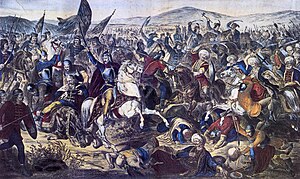| Battle of Kosovo | |||||||
|---|---|---|---|---|---|---|---|
| Part of the Ottoman wars in Europe and the Serbian-Ottoman Wars | |||||||
 Battle of Kosovo by Adam Stefanović (1870) | |||||||
| |||||||
| Belligerents | |||||||
| Supported by: | Supported by: | ||||||
| Commanders and leaders | |||||||
| Strength | |||||||
| 27,000–30,000; higher estimates up to 40,000[7] | 12,000–20,000; higher estimates up to 25,000 | ||||||
| Casualties and losses | |||||||
| Very heavy[2][8] | |||||||
The Battle of Kosovo took place on 15 June 1389[A] between an army led by the Serbian Prince Lazar Hrebeljanović and an invading army of the Ottoman Empire under the command of Sultan Murad Hüdavendigâr.
The battle was fought on the Kosovo field in the territory ruled by Serbian nobleman Vuk Branković, in what is today Kosovo, about 5 kilometers (3.1 mi) northwest of the modern city of Pristina. The army under Prince Lazar consisted mostly of his own troops, a contingent led by Branković, and a contingent sent from Bosnia by King Tvrtko I, commanded by Vlatko Vuković. However, Lazar was also supported by a Christian coalition from various European ethnic groups. Prince Lazar was the ruler of Moravian Serbia and the most powerful among the Serbian regional lords of the time, while Branković ruled the District of Branković and other areas, recognizing Lazar as his overlord.
Reliable historical accounts of the battle are scarce.[9] The bulk of both armies were wiped out, and Lazar and Murad were killed. The battle marked the only time in history when an Ottoman Sultan was killed in battle. Serbian manpower was depleted and had no capacity to field large armies against future Ottoman campaigns, which relied on new reserve forces from Anatolia. The Serbian principalities that were not already Ottoman vassals, became so in the following years.
The mythologization of the battle and writings began shortly after the event, though the legend was not fully formed immediately after the battle but evolved from different originators into various versions. In Serbian folklore, the Kosovo Myth acquired new meanings and importance during the rise of Serbian nationalism in the 19th century as the Serbian state sought to expand, especially towards Kosovo which was still part of the Ottoman Empire. In modern discourse, the battle would come to be seen as integral to Serbian history, tradition and national identity. Vidovdan is celebrated on June 28 and is an important Serbian national and religious holiday as a memorial day for the Battle of Kosovo.[10]
- ^ a b Fine 1994, p. 409
- ^ a b Fine 1994, p. 410, Thus since the Turks also withdrew, one can conclude that the battle was a draw.
- ^ Emmert 1990, Surprisingly enough, it is not even possible to know with certainty from the extant contemporary material whether one or the other side was victorious on the field. There is certainly little to indicate that it was a great Serbian defeat; and the earliest reports of the conflict suggest, on the contrary, that the Christian forces had won.[page needed]
- ^ Waley, Daniel; Denley, Peter (2013). Later Medieval Europe: 1250-1520. Routledge. p. 255. ISBN 978-1-317-89018-8.
The outcome of the battle itself was inconclusive.
- ^ Oliver, Ian (2005). War and Peace in the Balkans: The Diplomacy of Conflict in the Former Yugoslavia. I. B.Tauris. p. vii. ISBN 978-1-85043-889-2.
Losses on both sides were appalling and the outcome inconclusive although the Serbs never fully recovered.
- ^ Binns, John (2002). An Introduction to the Christian Orthodox Churches. Cambridge University Press. p. 197. ISBN 978-0-521-66738-8.
The battle is remembered as a heroic defeat, but historical evidence suggests an inconclusive draw.
- ^ Cite error: The named reference
Cox30was invoked but never defined (see the help page). - ^ Emmert 1991, p. 4.
- ^ "ИСТОРИЈА КОЈУ НИСМО УЧИЛИ НА ЧАСОВИМА: Милош Обилић је био турски заточник, али јесте убио Мурата на Косову". www.intermagazin.rs (in Serbian).
- ^ Đorđević 1990.


